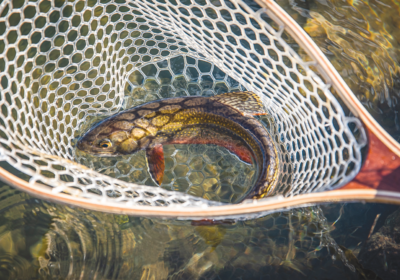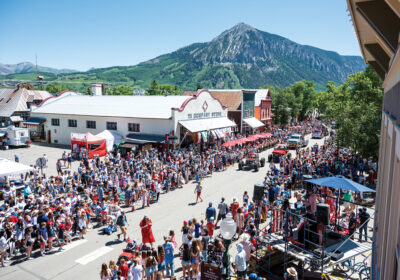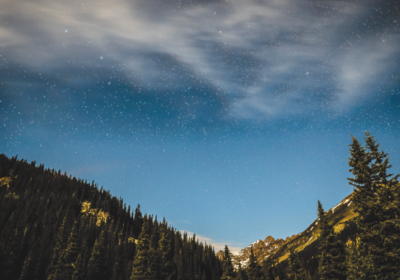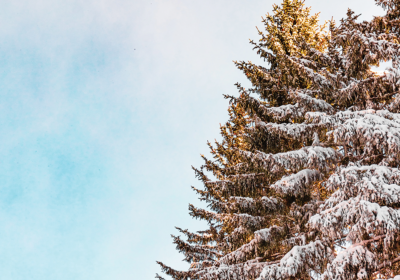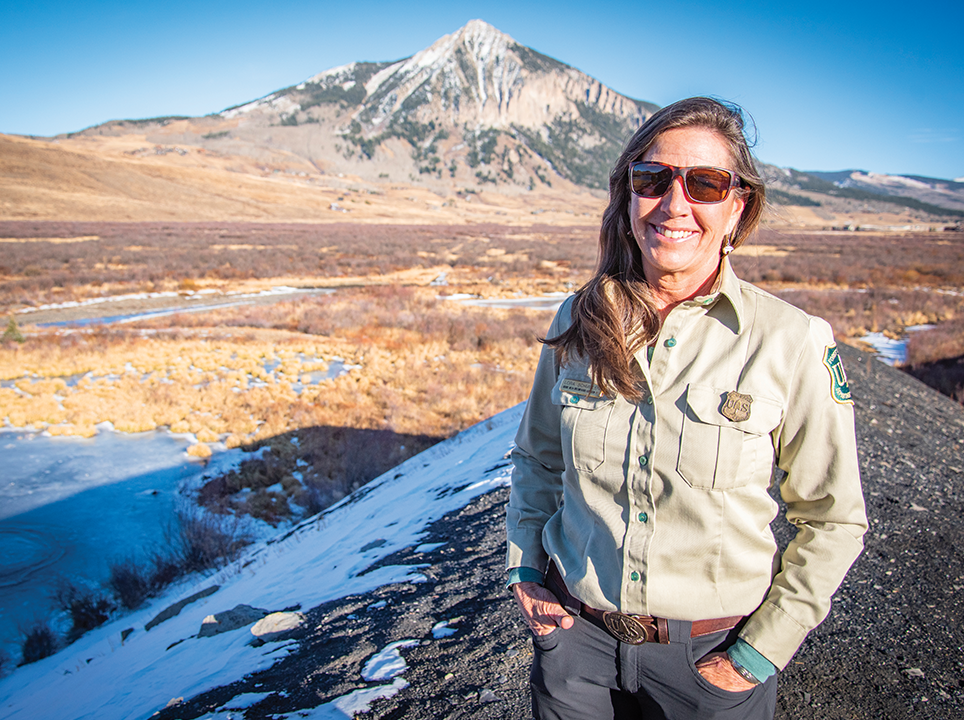
Protecting the Forest: Ranger Lora Schmillen
Story By Kristy Acuff
“My action figure would come with a hovercraft to have minimal impact to the trail, and mounted to the front would be a swinging chainsaw and a large claw like the kind on a crane to pick up the pieces of downed timber. It would be a kind of single-track transformer machine, with a solar-powered cooler and a portable jet-boil for emergencies. Oh, and maybe a sunshade,” says forest ranger Lora Schmillen.
Since 1998, Lora has worked as a trail crew leader, backcountry snow ranger, visitor information specialist and forest protection officer for the Gunnison Ranger District, travelling around the local backcountry maintaining resources and educating the public about their national forests.
If you had asked her when she was a young girl what she wanted to be when she grew up, unlike most children who respond with glamorous, out-of-reach occupations like “astronaut” or “famous person,” Lora would have said “forest ranger,”’ and for the past 21 years, that is exactly what she has done.
“In my book, I definitely have the best job in the world,” says Schmillen. “And yes, even as a girl on camping trips with my family, I would look at a ranger and say, ‘That is what I want to do for a living.’ I am so lucky to work with the most dedicated, down-to-earth people who love protecting our national forests as much as I do. I work outside four or five days every week, maintaining trails and camping areas and educating the public. That’s my job—to help protect the amazing resources of this valley.”
In the winter, Lora and her fellow snow ranger, Joe Laughlin, ski or snowmobile up and down the valley’s drainages, making sure everyone is playing by the rules in this far-flung paradise in order to protect it.
“If it is 40 below and the forecast says it’s going to warm up, then we spend the morning tuning skis or doing work around the office before heading out. But generally, our team will be out there seven days a week,” Lora explains. “We travel on skis, snowmobiles or fat bikes up and down the drainages, looking to educate people and manage the resources by enforcing regulations.”

They check for snowmobile registrations and remind people to pick up after their dogs and leave no trash. They compile usage information and user profiles and make signs and guidelines so people don’t unknowingly encroach on private property or closed areas.
“Thank goodness for the Crested Butte Avalanche Center,” Schmillen says. “We always check the CBAC website daily and, of course, travel in teams.”
During one winter patrol last year, Schmillen and Laughlin investigated a large smoke plume in the Kebler Pass area. They followed it to the source, which turned out to be a group of European snowmobilers throwing a grill party in the middle of the woods.
“They had giant grills and more meat than I have ever seen in one place—steaks, burgers and sausages as big as my arm that they brought here all the way from Poland,” Schmillen recounts, smiling. “They fed us a sampling of everything they had and then we were on our way. We returned to the party site later and the snowmobilers had left the area super clean. It was a perfect example of having a great time in the forest and Leave No Trace. We are hoping it was an annual pilgrimage and that we will see them again.”
“We always check the CBAC website daily and, of course, travel in teams.”
In the summers, Lora works with crews to maintain the forests and trails and educate backcountry users. If you have walked or ridden the area’s trails, you have likely benefited from the fruits of her labor. She leads off-highway vehicle (OHV) trail crews to maintain the motorized trails of the area’s national forest lands, removing downed trees, maintaining switchbacks, erosion bars and whatever else is needed to sustain the resources against the impacts of the growing number of backcountry users. The crews also work to minimize the impacts in the valley’s drainages by putting up signs and boulders to prevent resource damage. The goal is to try to corral users into staying on the trail and treading lightly.
“The summers are getting more crowded, that is certain,” Schmillen says. “But one thing I have learned that is almost universal is that the people who come here love nature. They love the fresh air and water, they love the sound of insects and watching for wildlife and the sunset over the mountains. Sometimes they do not pick up their trash or douse their campfires, sometimes they camp too close to water sources and they definitely do not always pick up after their dogs, but I believe that they universally love this place and the natural world.”
When I remind her of the stories of backcountry “toilets” left abandoned for others to clean up (as was the case last fall, according to local land steward Dave Ochs and his trail crew, who cleaned up the mess), Lora admits that not all of the visitors behave responsibly during their visits to the forest.
“Okay, maybe all but 1 percent of the people who visit the backcountry here love it,” she concedes. “Maybe that 1 percent do things like that because they are uninformed, or maybe they know better, maybe they are lazy or they just don’t care but I truly believe that 99 percent of people who recreate and visit the national forests love the forests as much as I do and they just need information and guidance. And that is what we are here to do—to guide them and, in doing so, protect these resources.”
We talk about our country’s system of national forests, national parks and wilderness areas and how this sets us apart from other nations and inspires patriotism like nothing else does, or can.
“We as a nation have more public lands than almost any other country and certainly more wilderness,” says Schmillen. “And our love and devotion to the land and our attachment to it, especially out west, set us apart from other countries. We have eight wilderness areas, including one Bureau of Land Management (BLM) area in the Gunnison National Forest alone, and there are a lot of people with passion for these lands. A lot of partners, organizations and individuals are working to protect and preserve these lands. This stewardship is something special that is not happening as much in other countries. I think it does inspire a special kind of patriotism and pride that we as a nation have chosen to protect and preserve these places.”
Schmillen’s title, “forest protection officer,” has undertones of law enforcement and I ask if she has ever encountered serious resistance when she finds people behaving badly in the forest. She explains that as a forest protection officer she is not armed but she can call for back-up from local law enforcement or the armed forest service officers if a situation escalates and she feels threatened.
“We are trained to assess situations and know when to back away,” she explains. “If we see a situation that looks out of control with alcohol or drugs, we keep our distance. We call for back-up and make it clear that we are on our radios notifying others so that they know we are not alone. I am not armed except for these,” she jokes, as she kicks her boots in a pseudo-karate chop.
Because of her training to back down if things escalate, Schmillen says she has never felt threatened or in danger while on the job. She recalls an incident when she was following a pick-up truck that was driving erratically up a local dirt road. When the truck stopped, she approached and saw that the occupants were visibly intoxicated, so she yelled from a distance to “slow down and be careful on this dirt road,” before retreating to her truck to call the sheriff.
When asked whether she feels out of place as a woman working as a forest service ranger, Lora quickly dismisses the idea. “Actually, the Forest Service has been hiring women since the early 1900s. It is an organization that actively recruits women to work in the field. One of the women we celebrate was a fire lookout hired in the early 1900s. I don’t know if she wore a long skirt but I know she wore heavy boots. Being a woman in this job has never been an issue for me. Working here is definitely a dream come true. My supervisor, Greg Austin, is the most down-to-earth, by-the-law backcountry guy. And everyone I work with is so dedicated to our mission, I feel blessed,” she says. “My parents raised me to love the outdoors and we spent our vacations in the mountains. When I first came to the Gunnison area, I knew immediately I wanted this to be my home. I feel very fortunate to be a part of this community and lucky to work in a job I love.”



